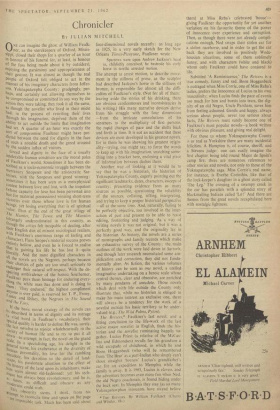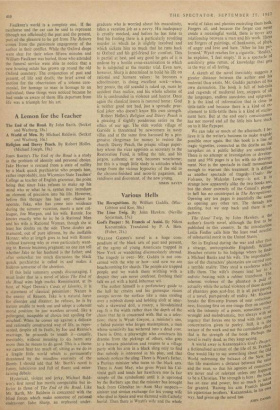Chronicler
By JULIAN MITCHELL NE can imagine the ghost of William Faulk- ner, as the storekeepers of Oxford, Missis- siPPI, closed their shops for a quarter of an hour in honour of his funeral (or, at least, in honour of the fuss being made about it by outsiders), enjoying the parsimony and appropriateness of their gesture. It was almost as though the real People of Oxford felt obliged to act in the manner of his imaginary characters from Jeffer- son, Yoknapatawpha County: grudgingly, per- haps, and certainly not allowing themselves to be compromised or committed in any way by the action they were taking, they took it all the same, as though the novelist who lived in their midst had, in the process of rewriting their lives through his imagination, deprived them of the ability to act outside the limits that imagination bad set. A quarter of an • hour was exactly the Sort of compromise Faulkner might have pre- dicted between the need for dignity in the face of such a notable death and the greed aroused by the sudden influx of visitors.
Greed and dignity in the face of a usually intolerable human condition are the moral poles Of Faulkner's world. Sometimes it has been de- scribed as a socio-economic struggle between the Mercenary Snopeses and the aristocratic Sar- torises, with the Snopeses and greed winning: sometimes it has been seen as a metaphysical Contest between love and lust, with the impotent (whose capacity for love has been perverted into lust for material possessions) winning short-term victories over those whose love is for human beings, yet losing everything that is of spiritual value. Thus at the end of the great trilogy of Tl, Hamlet, The Town and The Mansion (strangely underestimated in this country, as though the critics felt incapable of dealing, after their English diet of minute sociological realism, With Faulkner's enormous range of feeling and With Flem Snopes's material success proves entirely hollow, and even he is forced to realise that in gaining his life he has lost it—quite literally. And the most dignified characters in !,'1 the novels are the Negroes. perhaps because their chances of gain are too small seriously to endanger their natural self-respect. With the de- spairing ambivalence of the honest Southerner, h,Ict• pays them homage for enduring every- retinig the white man has done and is doing to anyone is endured,' the highest compliment , is ever paid, is reserved for 1'. P., Frony, Luster and Dilsey, the Negroes in The Sound and the Fury. Le If the basic moral strategy of the novels can ,.° described in terms of dignity and its outrage ' S vital word in Faulkner's vocabulary), their ifIce,ial quality is harder to define. He was, surely, the last novelist to rejoice wholeheartedly in the variety' of human life and to try to put it all do to attempt, in fact, the novel on the grand ogle. In a specialising age, his delight in the r4eral scene, his exuberance at the diversity of 41.1ellan Personality, his love for the rambling sea cd°tc, his devotion to the detail of land- oic13,!' his passionate attention to the effect of msto ry of the land upon its inhabitants, make nique L seem almost old-fashioned : yet his tech- "as always been revolutionary. and he is, 4t times modernist as difficult and obscure as any Thetnist could wish. atter, Is Obscurity stems, I think, from his ._,__an113.1 to reconcile time and space on the page unnossible task. Much has been said about four-dimensional novels recently: as long ago as 1925, in a very early sketch for the New Orleans Times-Picayune, Faulkner wrote:
Sparrows were upon Andrew Jackson's head as, childishly conceived, he bestrode his curly horse in terrific arrested motion.
The attempt to arrest motion, to describe move- ment in the stillness of prose, as the sculptor had described Jackson's horse in the stillness of bronze, is responsible for almost all the diffi- culties of Faulkner's style. (Not for all of them : leaving aside the stories of his drinking, there are obvious carelessnesses and inconsistencies in his writing.) His many narrative devices derive from his struggle with the four dimensions —from the intricate convolutions of • his sentences to the multiplicity of first persons, the rapid changes of pace and the shifts back and forth in time. It is not an accident that these devices are most developed in his greatest novels. for in them he was showing his greatest origin- ality—trying, one might say, to force the words to keep up with his imagination, snatching some- thing into a bracket here, enclosing a vital piece of information between dashes there.
Another way -of looking at it would be to say that he was a historian, the historian of Yoknapatawpha County, eagerly pointing out the significant landmarks, dates, characters, sweeps of country; presenting evidence from as many sources as possible, questioning the reliability of the sources, collating, sifting, interpreting, and trying to keep a proper historical perspective —all at the same time. And, naturally, failing to be perfectly objective, too involved in the inter- action of past and present to be able to resist editing, footnoting and judging. As a way of writing novels it was not original, but it was a perfectly good way, and the originality lay in the historian. As history, the novels are a series of monographs and family records which make an exhaustive survey of the County : the main outlines of the work were laid down in Sartoris, and though later research necessitated some am- plification and correction, they did not funda- mentally alter. As fiction, the various volumes of history can be seen as one novel, a unified imaginative undertaking on a heroic scale whose central themes, clear and obsessive, are enriched by many pendants of anecdote. Those novels which deal with life outside the County only illustrate that, while no historian is obliged to make his main interest an exclusive one, there will always be a tendency for the work of a novelist outside his basic territory to be under- valued (e.g., The Wild Palms, Pylon).
The Reivers,* Faulkner's last novel, and a fitting conclusion to the life-work of the last active major novelist in English, finds the his- torian and the novelist ruminating happily to- gether. Lucius Priest (a relative of the McCas- tins and Edmondses) recalls for his grandson a wild escapade of childhood, in which he and Boon Hogganbeck (who will be remembered from 'The Bear' as a part-Indian who simply cant shoot straight) 'borrow' Lucius's grandfather's car for an expedition to Memphis while the family is away. It is 1905, Lucius is eleven, and the adventure becomes even more fun when Ned. the old Negro coachman, is found biding under the back scat. In Memphis they stay (as so many Yoknapatawphan innocents have stayed before * THE REIVERS. By William Faulkner. (Chatto and Winidni, them) at Miss Reba's celebrated 'house'— giving Faulkner the opportunity for yet another variation on his favourite theme of the power of innocence over experience and corruption. Then, as though there were not already compli- cations enough, Ned swaps their stolen car for a stolen racehorse, and in order to get the car back they are involved in positively Wode- housian situations, some of them sublimely funny, and with characters (white and black) whom only Faulkner could have conjured to life.
Subtitled 'A Reminiscence,' The Reivers is a true comedy, funny and sad. Boon Hogganbeck is outraged when Miss Corrie, one of Miss Reba's ladies, prefers the innocence of Lucius to his own masculinity; when Lucius finds the pace of events too much for him and bursts into tears, the dig- nity of an old Negro, Uncle Parsham, saves him from feeling ashamed. Gentle and happy, always serious about people, never too serious about facts, The Reivers must surely become one of Faulkner's most popular novels—a book written with obvious pleasure, and giving real delight.
For those to whom Yoknapatawpha County is as real as Yorkshire there are many incidental felicities. A Hampton is, of course, sheriff, and a Stevens judge: one can easily imagine the first chapter being told round Major de Spain's camp fire; there are numerous references to other stories and novels, not only to those of the Yoknapatawpha saga. Miss Corrie's real name, for instance, is Everbe Corinthia, like that of the lock-keeper's daughter in a ghost story called 'Ile Leg.' The crossing of a swampy creek in the car has parallels with a splendid story of blackmailing Indians called To!' And there are themes from the great novels recapitulated here with nostalgic lightness.
Faulkner's world is a complete one. If the racehorse and the car can be said to represent (though not officiously) the past and the present, part of the pleasure to be got from The Reivers comes from the passionate engagement of the author in their conflict. While the Oxford shops were shut for their token fifteen minutes and William Faulkner was buried, those who attended the funeral service were able to notice that a new housing estate has grown up round the old Oxford cemetery. The conjunction of past and present, of life and death; the brief arrest of motion for the observation of a solemn cere- monial, for homage to man in homage to an individual; these things were noticed because he had made us aware of them. His departure from life was a triumph for his art.











































 Previous page
Previous page